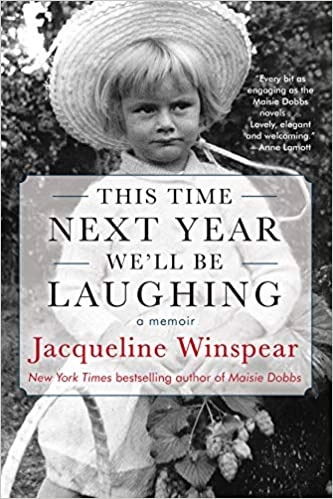Reading Time
7 hrs 18 mins
How long to read This Time Next Year We'll Be Laughing?
The estimated word count of This Time Next Year We'll Be Laughing is 109,275 words.
A person reading at the average speed of 250 words/min, will finish the book in 7 hrs 18 mins. At a slower speed of 150 words/min, they will finish it in 12 hrs 9 mins. At a faster speed of 450 words/min, they will finish it in 4 hrs 3 mins.
| This Time Next Year We'll Be Laughing - 109,275 words | ||
|---|---|---|
| Reading Speed | Time to Read | |
| Slow | 150 words/min | 12 hrs 9 mins |
| Average | 250 words/min | 7 hrs 18 mins |
| Fast | 450 words/min | 4 hrs 3 mins |
- Authors
-
Jacqueline Winspear
More about This Time Next Year We'll Be Laughing
109,275 words
Word Count
for This Time Next Year We'll Be Laughing
312 pages
Pages
11 hours and 45 minutes
Audiobook length
Description
“Jacqueline Winspear has created a memoir of her English childhood that is every bit as engaging as her Maisie Dobbs novels, just as rich in character and detail, history and humanity. Her writing is lovely, elegant and welcoming.”—Anne LamottThe New York Times bestselling author of the Maisie Dobbs series offers a deeply personal memoir of her family’s resilience in the face of war and privation. After sixteen novels, Jacqueline Winspear has taken the bold step of turning to memoir, revealing the hardships and joys of her family history. Both shockingly frank and deftly restrained, her story tackles the difficult, poignant, and fascinating family accounts of her paternal grandfather’s shellshock; her mother’s evacuation from London during the Blitz; her soft-spoken animal-loving father’s torturous assignment to an explosives team during WWII; her parents’ years living with Romany Gypsies; and Winspear’s own childhood picking hops and fruit on farms in rural Kent, capturing her ties to the land and her dream of being a writer at its very inception. An eye-opening and heartfelt portrayal of a post-War England we rarely see, This Time Next Year We’ll Be Laughing chronicles a childhood in the English countryside, of working class indomitability and family secrets, of artistic inspiration and the price of memory.
